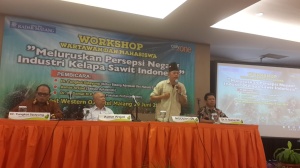Culprit or Victim? Conflicting Narratives on Indonesian Palm Oil Industry
This blog discusses the significance and impact of competing narratives in shaping Indonesian policies on palm oil. Narratives are central to policy making processes. Hence, to understand a particular policy making process, it is important to understand the narratives employed by the actors involved. Policy debates are not only an interplay between arguments or facts, but a contest between discursive frameworks or stories, as illustrated in various works by scholars (such as Jacobs and Sobieraj, Bedsworth, Lowenthal and Kastenberg and Birdgman and Barry).
Fieldwork research in Indonesia discovered two conflicting narratives in the palm oil industry-related policy making process. The first, constructed byNGOs, is the “Source of Destruction” narrative. Here, the palm oil industry is portrayed as the source of destruction, and is based on Indonesia’s palm oil industry rapid expansion due to rising demands in 2000s, which led to environmental degradation and adverse social impacts. According to this narrative, efforts to halt further destruction were partly successful, but not enough. Corrupt practices amongst companies and government officials made it difficult to push real reform. The narrative concludes with the call for action to push more reform, such as by reviewing the existing plantation permits of palm oil companies.
The second narrative, the “Trade War” narrative, was constructed by palm oil companies and their association (GAPKI) and views Indonesia’s palm oil industry as a target of trade wars waged by developed countries. Due to oil palm’s competitive value in the 2000s, it overtook other vegetable oils in the market. Responding to this development, according to this narrative, developed countries, who are producers of these less competitive vegetable oils, began a black campaign against palm oil to regain their domination in the vegetable oil market. This was done via controlling NGOs, enacting non-tarrif barriers to their market, and putting pressure on the government of Indonesia. The efforts by the developed countries are almost successful, marked by the moratorium and the President’s visit to the Greenpeace’s ship. The narrative conludes with a call that it is the time for Indonesian people to fight back.

In terms of the impact on policy making processes, both narratives have been partly successful in shaping the Indonesian government’s policies on palm oil. The “Source of Destruction” narrative colored the introduction of the Law on the Prevention and Elimination of Forest Destruction and the moratorium for forest conversion in 2011 (Presidential Instruction No. 10/2011), which is extended until 2015 (Presidential Instruction No. 6/2013). However, the “Trade War” narrative was also successful in halting important demands from the NGOs, such as reviews on existing concession permits. The “Trade War” narrative also contributed to the establishment of the inter-ministerial task force against the anti-palm oil black campaign and the inclusion of palm oil in Indonesia’s economic diplomacy.
By focusing on the narratives shaping the policy making process on palm oil in Indonesia, this research seeks to provide a comprehensive understanding on the dynamics surrounding the process, which is significant to ASEAN and Canada. For ASEAN, especially Indonesia and Malaysia, palm oil is an important export commodity. For Canada, as a producer of canola oil and soybean oil, it is a rival for palm oil producers in the global vegetable oil market. In this context, understanding the competing narratives in Indoensian’s palm oil industry (shaping various related policies, including Indonesia’s economic diplomacy) is important to understand the relationship between Indonesia, a major actor in ASEAN, and Canada.
This blog post has been written by Shofwan Al Banna Choiruzzad. Shofwan is Executive Secretary of the ASEAN Study Center and lecturer in the Department of International Relations of the Faculty of Social and Political Sciences at the University of Indonesia. He is also Junior Fellow (2013-2014) under the ASEAN-Canada Research Partnership. For more information on the ASEAN-Canada Research Partnership, please click here.



